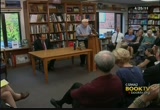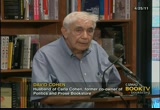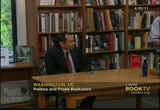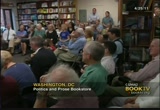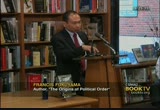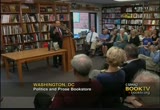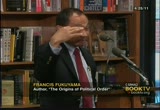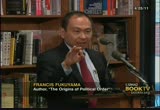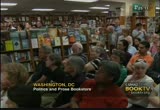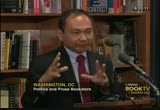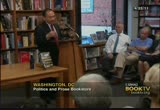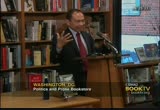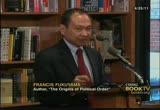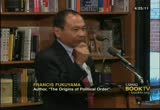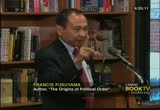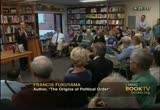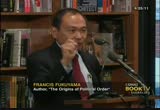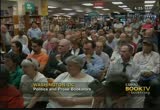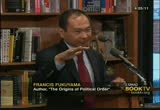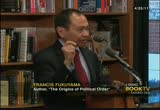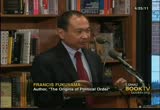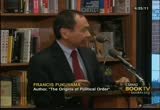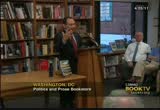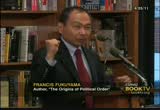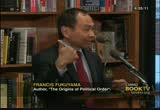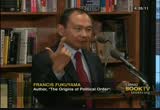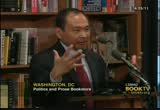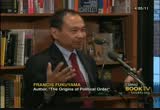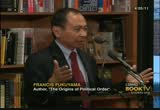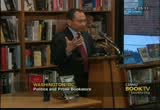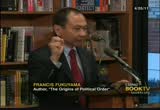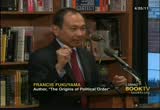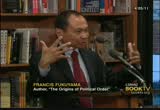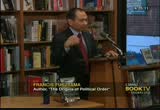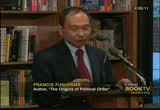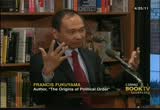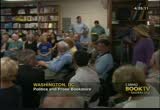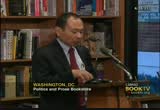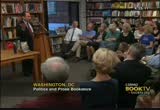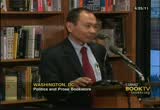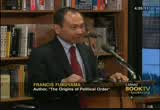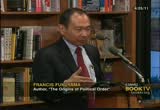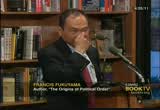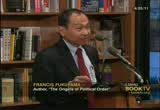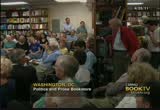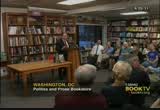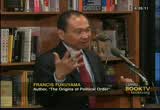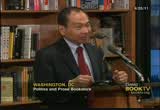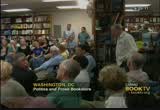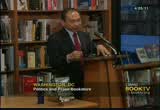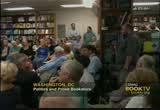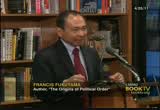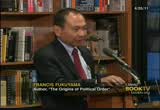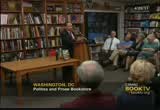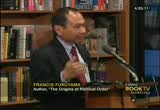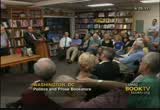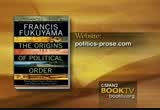tv Book TV CSPAN July 3, 2011 3:00pm-4:15pm EDT
3:00 pm
linda hogan, thank you for being on booktv. >> guest: thank you. >> host: coming up in the next couple months on booktv, ann coulter, michael moore, david brooks. thanks for being with us, here's more booktv. >> you can find out about upcoming booktv weekend programs like "in depth "by using your mobile phone. simply text the word "book" to 99702 to receive a weekly e-mail about our schedule. and sign up now for a chance to receive a signed copy of linda hogan's book, "people of the whale." standard message and data rates apply. ..
3:01 pm
>> before we begin, i want to just say that this is the momentous time for politics and prose. as you know, i'm david cohen, who is carla cohen's husband. she and barbara meade, together with the stellar star here at politics and prose, you the very enbeiged and articulate lovers of books and ideas and the community of writers, publishers, editors, agents have made politics and prose into more than a bricks and motar
3:02 pm
bookstore. it is a thriving community institution, it's a setting for the discussion of and dissemination of ideas and howard public space where people meet, talk, discuss, and do it in a civil way. and it will continue that way under the leadership of the new owners brad graham and alyssa muscatine. i just want concern continuity will stand and appropriate changes will be made to. but not around what's a community institution, around ideas, and around public space. i very much wanted to introduce francis fukuyama tonight because i respect him even though as i told him, i taught civil society activist in asia and africa work
3:03 pm
on civil society. and we had a lot of vigorous discussion about the end of history. 10-15 years ago. and i very -- so -- that's one reason. but the more important reason is he is an open minded scholar. who embraces big ideas who's not encapsulated by silos or artificial boundaries. he's clarifies as he pursues nuance and complexity. don't be fooled by the fact that this book and after the cohen says from prehistoric times to the french revolution. professor fukuyama takes you through the state, counter, and government, and what's the
3:04 pm
origin. having one of those in place doesn't suppose that the others will have vibrant and alive institutions. he discusses failed and failing states, provides probing questions ab the -- about the united states as well. i love the fact that you defend the necessity of politics even as you take us through political anxiety and political decay and it makes us think about our own society here in the united states. i have not read the whole book yet. but i've already been made to think for me unreconstructed and open-minded liberal you helped me realize there's more than friedrich hayek that market absolutism. let us welcome francis fukuyama and -- [applause] [applause] >> let's also pay tribute to the good work of c-span which adds
3:05 pm
to the public discourse in this country and the folks who work the cameras and make it happen. [applause] [applause] >> thank you. it's really a great honor to be here and have this wonderful audience. and i'm very grateful that you are all here at politics and prose. one the really nice things about being able to speak to a new book is to go to real brick and motar bookstores and realize there are people who like real books and come out for events like this because of the intellectual challenge and interest. thank you all for coming. i'm going to get straight into this. i wrote this book for a number of reasons. samuel huntington, the political scientist was a teacher. he wrote a book in 1968 called "changing societies" rereading it now in light of the arab spring is probably one the best
3:06 pm
guides to what is going on in the middle east at the present moment. but it's a book that needed to be updated. i thought of a project of, you know, doing a revision of that book. among other things it opens on the very first page, it says the soviet union and the united states are equality developed political ordered. that didn't seem quite right after the fall of berlin wall. but the other, you know, major issues was the one that was just referred to. i've been thinking about nation building, failed states, afghanistan, iraq, somalia, iraq, haiti, the foreign policy challenges that we've faced weapon have the illusion which i would call the problem of getting to denmark. denmark is in quotations. it's not a real country. it's the mythical place that have low corruption, democracy, stable government, good services delivered very efficiently and so forth. we have the vision of denmark in the back of our heads and go to a place like afghanistan. how are we going to get
3:07 pm
afghanistan to look like denmark? and it doesn't work very well. and part of the reason that i began to realize was that we don't understand how denmark got to be denmark. i had a visiting professorship, so i've been going. most danes have no idea how denmark got to be denmark. it struck me as a political scientist, this ought to be a book you can go to to say where did political institutions come from. i didn't see one. so i decided to write it. that's why we get the book that i've produced. so i also did not want to write a book on the origins of politics that told this traditional eurocentric or anglocentric story. not because i'm opposed to england or the west. it's a distortion. it's been one that's taught in a lot of the discourse that really
3:08 pm
beginning with carl marx that sees england as the model for modernization. england's present is everybody's future. this is what carl marx said. what you realize when you something about the history of england, it is a very peculiar country in a number of ways that i will explain. to expect other countries to replicate i think is highly unrealistic. and, in fact, in my view, it was china, not the -- china did not establish the first state. that happened in a lot of places in egypt and mesopotamia. the chinese established the first modern state. not counting on your cousins and friends, but based on civil service, e rational bureaucracy, centralized administration. and they did this in the third century b.c. it's a historical achievement that i think a lot of people
3:09 pm
have not adequately recognized. and so instead of starting with england or, you know, greece and rome and then going through the magna carta and the rise of the democracy in england, start with china. china created the first modern state. why are other societies different from china? that's the basic background. now there are three important baskets of political institutions that we need to think about. first is the state itself. the state is all about power. the state is the ability to concentrate power in the a hierarchy and use it to enforce rules over a particular territory. all right? in the developing world world -d this again is why i think we sometimes take politics for granted. we assume that things will happen. like, you know, long term, i've lived in fairfax county for 20 years. and the potholes always get filled every spring. why?
3:10 pm
but not in new guinea? there's a hidden social structure that provides the services and does it pretty efficiently, at least many a rich county like fairfax. not so well in the district. it's funny why the differences happen. i think all of the antigovernment activist of which already many, especially in our society, don't understand that if you want a country that doesn't have a strong government that's able to enforce rules, you ought to move to somalia or afghanistan or, you know, a less developed country that actually cannot enforce rules on it's own territory. you know, somalia, if you want to own not just an assault rifle or rpg or shoulder fire, you are free to do it. but it's not a happy society. because it doesn't have institutional rights. that's the state. second is the rule of law. it's all about community rules of justice that are regarded as superior to the will of whoever
3:11 pm
happens to be running the government. whether that is a president, prime minister, king, monoarch, whatever, the executive in the society doesn't feel that he or she can just make up the rules on the fly, whatever they want. but they actually have to implement a law that someone else makes. all right? that's the second set. and then the third is institutions of accountability. today we associate those with democracy, elections, but that's not the only form of accountability. and in any event, when accountability institutions were first put into place in 17th century england, the king was accountable to parliament that only accounted 10% of the population. the richest 10% of you can have accountability without having democracy. as within china, you can also have moral accountability. that is to say a government can feel obligated to take the interest of it's citizens into account, even in the absence of
3:12 pm
elections. so the question is where do these come from? the state is all about the concentration of power, the rule of law and accountability are all means of limiting. the miracle politics is you get the president of the united states which is the most powerful individual in the human history, he can nuke the rest of the world if he wants to. but he doesn't because it is all limited by law and accountability institutions. it's a miracle of modern politics. all right? i'm going to tell you a few stories in the book from each of the baskets. let's begin with the state. the state in some sense in my view is a big struggle against the family. human nature tells you a couple of things. there's a universal human nature. there are a cupful biological principals that give the notion. before the rise of the state, you have people clubbing each other over the head in a war
3:13 pm
against all. that was actually never true. human societies never went through that period. they were always social. and they are social because they are born with certain characteristics that allow them to cooperate. one of them is the principal called kin selection, or inclusive fitness by the biologist, which simply means you are going to be altruistic in proportion to the number genes. you are going to favor relatives. the second principal is reciprocal altruism. you scratch my back, i'll scratch yours on a face to face basis. no human child grows up anywhere has to be taught these mechanisms. these are in built forms. they are the way that rerelate to each other, friends and family. and in the absence of a modern institution, that forces you to mire somebody with qualifications, rather than your cousin or your brother-in-law, that's the way you are going to do it. that's the kind normal politics
3:14 pm
that will insert itself. in a sense, you know, the states arose in societies that were organized tribally. meaning people were in large kin groups. they all believe they are descended from a common anisesser, they are third, fourth and fifth cousins. how do you get from a state based on kinship, to one that's based on citizenship. in which it's not a matter of who you are related to, it's the fact that i'm a citizen of the state of france or japan or whenever. that's why there is the struggle, the biological urge to protect your children. how did this happen in china? it unfortunately happened as a result of centuries long military conflict. there's a famous political scientist charles tille who was famous for arguing in the case of europe that the state makes war and war makes the state. it's military competition that
3:15 pm
drove people out of tribal societies into the hierarchical units. if you look at chinese history, that is exactly the story that unfolds. at the beginning of the western dynasty, these tribes come in, they conquer the shang people. they are split up. they fight about 1200 wars with one another. in the warring states, they fight about 450 wars. the number is reduced only because so many states have been snuffed out and conquered at this point there aren't as many states to fight. finally it widows down, there's seven surviving states and finally in the year 221b.c., the state of shen conquers and establishes the first chinese dynasty. also in europe, 1800 years
3:16 pm
later, the need is accompanied with the warfare. if they find out you scrip's isn'ts and create an army, you will be better. in order to get the peasants, you need taxes and create a bureaucracy in order to tax and you immediate an administrative hierarchy to run the machine. this is what they do. they figure out if you hire your cousin to be a general, as lincoln did all of the appointments early on in the civil war, you are going to lose the war. right? you need a different principal. you need an impersonal merit-based principal. this is what the chinese did. they were the first one to come up with the civil service examination as a means to get into the country. they did this in the third century b.c. unfortunately, it didn't last. the great han dynasty saw
3:17 pm
centralized high quality government. it falls apart for a number of reasons? what happened? meaning aristocratic families, people with wealth and power recapture the government. this continues really through the dynasties and the modern chinese state that has been established already in the third century doesn't get put back into place really until about 1100 or so until the northern song period. the struggle around the family goes on for a long time. now the weirdest institution designed to create a powerful state and to beat back the family is a system of military slavery that developed during the dynasty the second big arab sign -- arab dynasty and was carried to the conclusion by the ottomans. what they did, they'd send out a group of people into the balkan
3:18 pm
providences of the empire, like football scouts, look for young men between the ages of 12 and 19. they would forcibly take them, raise them as slaves in the palace, but they would train them. not for lines of degradation, but to be senior military officers and administrators. and indeed the prime minister of the ottoman empire. and why did they create the strange institution? by the way, the people recruited in this fashion were not allowed to marry and they were not allowed to have children. if they did have children, they were exspelled from the corps and their children were never allowed to rise to position of status. why did they do it? all because of the family. the moment that you allow people in elite positions to have children, what are they going to want to do? secure positions for their children. and the ottoman's understood
3:19 pm
that a modern administration has to be based on promoting people by merit and therefore if you allow them to have families, you wouldn't be able to do this. they created in effect the one generation aristocracy. and the whole ottoman system began to collapse the moment these entrenched groups took the opening cause by famine and writhing inflation to start to demand their children be allowed to assume their positions. this is a general problem. in france, old regime france, before the french revolution, they faced exactly the same problem. wealthy elites that could oppose the king. what did they do? what does the french monarchy do? they sell offices. sell office of the tax collector or finance minister to wealthy individuals. this actually had an important impact in breaking up the
3:20 pm
opposition to centralization product of louie xiv and the other great monoarchs. again the desire to turn public -- first of all, there's a desire to privatize public office. you want to grab as much as the public sector as you can. in the early 1600s, it became permissible for the wealthy individuals that have bought public offices to burn them over to their children. along with the shoot toe, you'd get some other office. by the time, the entire french had been sold off to wealthy individuals. you can't create a modern state under the circumstances. one the thing that the revolution did was basically divested all of the old elites of not just their property and offices, but their heads in a lot of cases.
3:21 pm
and, you know, it took a violent revolution to eliminate that system. now let's talk about the rule of law. so this was the second really important basket of institutions. as i said, the rule of law are limitations. they are rule that is limit the discretion of rulers to do as they want. where does it come from? where do you get the system? my view, historically, it's always come out of religion. because if you think about it, religion is the only source of rules outside of politics where rulers are actually limited by rules that they themselves don't make. this is true in many civilizational conditions. it's true of ancient israel, true in the christian tradition, true in the world of islam, and true in indian under hinduism. in every one of these societies, you have a religious law that is made by religious authorities
3:22 pm
interpreted by hierarchies of religious judges, you know, the scholars in the case of islam, the brahman's. all of the cases they have to go to the religious authority to get sanction. in india, you are ton sand if -- sanity if id by a brahman. that's what we mean by rule of law. the only world civilization that did not have rule of law is china. the reason, they never had a central religion. it's amazing to think they got primitive because of a religion. you only have to worship your ancestors. there's really no authority that
3:23 pm
comes from that. it was completely controlled by the state. no chinese emperor has ever felt there's a higher source of law to obey. that continues to the present day. the chinese party does a constitution. they make the constitution. the constitution doesn't limit what they want to do. in the west, rule of law develops very early and very powerfully. one the heros in my book, the classic all like the reformation. i like the catholic church in a couple of important historical respects. in terms of the rule of law, the church was extremely important. in the post period, in the early middle ages, bishops and priest could marry and vice president children. they all ought to turn the benefits over to the children, got involved in the court politics, all wrapped up in the clan, shenanigans of all of the local princes and germany.
3:24 pm
and you have at one point in the late 11th century the rise of a pope gregory vii who was a titanic figure, like martin luther who comes after him in a few centuries, who realizes under the church eliminated the principal of being able to have children, it would not have moral authority to become an independent constitution. further more, at that point all of the bishops in the church were being appointed by the emperor. the church did not have control over the personnel policy. so he dollars that -- declares the churches independence, all of the priest and bishops have to be sell bent. the priests don't like it. it's a huge struggle.
3:25 pm
they fight a war. at the end of the period, the church can establish emperor. they have a law appointed only by the church, the first lawyers are all ecclesiastical lawyers, and it's really a creation that happens first in the church and then gets transferred to the secular realm. it also in the christian west divides church and state at the early point. the legal authorities have legitimacy and a separate hierarchy that is completely independent of european rulers. this is extremely important for the european development, because any european ruler that
3:26 pm
wants to be like a chinese emperor and do whatever the hell he pleases has to do with the fact that there's a preexisting legal con trains is that prevent him or her from doing that. all right the final baskets of institutions are institutions of accountability, a.k.a., democracy. so you sometimes get the idea that once the idea of equality gets out, it's just unstoppable. it just happens. i think wasn't things that you look at when you look at the rise of democracy is just how weird and in a way contingent it's emergence was. and it arose really because of the survival of a peculiar, feudal institution into modern times which was called the parliament. which european country in the middle ages had a body called an aestate, parliament, sovereign
3:27 pm
court in spain, cortez, and all of these were collections of notables of gentry of high nobility, sometimes with the bourgeoisie and they had to go to get positions to wage war and especially to collect taxes. all right? in the late 16th and 17th centuries you had all of the powerful monoarchs that wanted to believe like an emperor. they wanted to create the bureaucratic realm in which everything was uniform. they waged the long struggle against these estates in every single country. only in one of them did the parliament or the estates win that battle and that was england. and, you know, in a sense, it shows you how accidental history is. parliament didn't prevail in france, it didn't -- you know, it didn't prevail, by the way,
3:28 pm
the french had sold off all of the offices to wealthy individuals. once they took care of, you know, you take care of me and my family, i'm fine with everything else. we're not going to defend our liberties. as tocqueville said, it didn't happen in spain or russia where the czar basically recruited the entire nobility into his own military organization. it did happen in england for a very peculiar reasons. for parliament for a variety of reasons had a lot of solidarity. they hung together, they raised an army. they fought a civil war, defeated him, cut off his head. this was carl the 1st in the 1640s and then in 1688, they deposed another king james ii and brought in william to be their you know monoarch.
3:29 pm
because they didn't want to be taxed without parliamentary consent. it just happens in the one island nation, you get the powerful parliament that's able to force a institutional settlement on the english monoarch from there to the english is a short distance. john locke was a participant, he wrote the second treaty on government, that has to come out of consent, and then you get to the american revolution which is based on the principal, no taxation without representation. the distance from the english events and our own founding as a country based on democratic consent is not a long distance. it wouldn't have happened if we had been colonized by spanish or latin or america and it didn't happen on the time scale and it didn't result in a powerful
3:30 pm
commercial empire in the way that england revolveed accept for a accountability government and strong state. this is a miracle -- how did the miracle happen. if you think about it, there was no necessity and historical driving forces that dictated this would be the outcome. once england got there, it was a powerful model and other people wanted to imitate it. the fact they got there in the first place was historical accident. in china, because the state had been so powerful at such an early stage in the history, they never allowed free cities or bourgeoisie. they control because it is a potential source of opposition to the regime. let me just conclude with a couple of observations about how
3:31 pm
it relevant to understanding politics in the modern world. let's begin with india and china. every school has been doing the emerging market contrasting india and china. when china wants to build the dam, they have to move 1.2 million people out of the flood plane. they just do it. we're going to do it. people kick and scream and there's a lot of unhappiness. they do it. all of the people are moved out, they build the dam. high speed rail in chinese cities, turnpikes, infrastructure, right? because they have this very strong and relatively high quality authoritarian government that does not need to respect, you know, the interest of citizens, in india, just to give you one example, the motor company a couple of years ago, wanted to establish a car assembly.
3:32 pm
they get hit with lawsuits, trade unions, they all go on strike protesting the siting of the plant. they say enough, we're not going to do it. they put the plant elsewhere. in india, you have a real problem with basic infrastructure. because there are divided law govern democracy. there are checks and balances. the indian state can't do anything it wants because it's involved in the fashion where law and accountability are much more important. this is the inheritance of british colonialism or something that happened in the last hundreds of years in the history of country. i think having written the book, i now understand that there was total nonsense. these reflect patterns of government that are at least, you know, 2500 years old. since the unification of china in 221 b.c., the country has
3:33 pm
fallen apart in periods, but it always has come together and spent more time as a unified authoritarian country governed by a single authority than it has in a state of disunity. india is opposite. it's only mirror ifed in two periods, when the moguls or the british invaded, none of them were able to extend their rule. so the fact that india is a democracy i don't believe has deep historical roots. the fact it's not chinese-style dictatorship. nobody has ever been able to rule india in that kind of authoritarian fashion. indian society is way too tough. it's organized teen cast, you know, village associations and very powerful religious groups, all of which have resisted any
3:34 pm
political effort to, you know, to dominate. the final thing, i mention that the eurocentric accounts of modernization don't understand how peculiar european modernization is. i think that's important to remember. when we try to modernize through development assistance a country in the third world today. how was european peculiar? the exist from kinship is not done by a powerful state that demanded that people have allegiance to it. it was done by the catholic church. the church at the end set rules. they forbade concubines, they forbade divorce, they forbade marriage up to five agrees of relatedness of cousin.
3:35 pm
all of these were means of cutting off the ability of clans and tribe group to keep property within the clan. they also supported the right of women to hold and alienate property at the very, very early stage in the middle ages. and they did this for self-interested reasons. not trying, but because they wanted to break the economic power of the tribal groups. it worked beautifully. turns out a lot of widows and spinsters ended up with all of the money in the family. when they died without the children, guess who inherited all of the money? catholic church. churches holdings go up by 20 or 30% in the first part of the 8th century as a result of the changes in the rules. it means that individualism started in european at a much, much early point. it wasn't a product of the industrial revolution or anything like that. within two or three generations of their conversion to christianity, all of the tribes
3:36 pm
were already no longer living in this tribal associations. and in england, it gets carried to the extreme where if you were a parent that was enough to turn over your fortunate to your son before you died without having signed a maintenance contract, you could be in big trouble. because, you know, the kid could say, sorry, dad, you know, i got my own business to worry about. i'll try to take care of you. but it's not a priority. and so in english families, you know, already in the 1300s you are having families find contracts with each other. because you could not rely on children to take care of their parents in old age. so already that presumes a huge amount of individualism. we're not bound by what ernest called the tyranny of cousins in which everything is within the
3:37 pm
big conglomerations of relatives. we're individualistic. finally the sequence in europe goes like this. first rule of law, then you conduct a powerful centralized state, and only later do you get democratic ability. law comes before the state building. the early modern european monoarchs that wanted to create chinese-style states had to do it against the background of existing laws that limited their ability to exercise power. final anecdote i'll leave you with is my favorite character was the evil empress. the evil empress was the only woman in chinese history whoever established dynasty in her own name, as opposed to ruling as a region through her son or her husband. she came early in the dynasty in the 6th century. he was originally a concubine of
3:38 pm
the second emperor. she got into his graces and displaced the existing empress by having her daughter had an audience and was smothered. the death was blamed on the empress. and she killed a couple of her sons in the rise to power and kill off what stood in the way of her rise to power. and, you know, she -- it didn't do much for womens empowerment, unfortunately, in china. there's actually a plaque in the forbidden city that worns against women in politics after the experience of the evil empress wu. the reason that i tell the story, you contrast to a couple of stories from europe. you had a couple of big revolts. in the 1520s, there's the thing called the revolt.
3:39 pm
they caught a civil war in essence for a few years. and the emperor won. defeated his enemies. there's a similar war, civil war called the frand in france. they fought a very bloody civil war. the king defeated the foes. both of those cases, it's very remarkable that charles ii and louie xiv pardon their opponents and go back and live happily ever after. if this would have been china, they would have killed off every member of the lineage to make sure the rope of dissent was broken. i do think that, you know, the early presence of law in european development really did make some difference in terms of the kind of authoritarian government that you could actually create. of course, until the horrible governments, you know,
3:40 pm
totalitarian governments of the 20th century were as a result of modernization you undermine all of the authority of the traditional forms of law. so this is the book. i mean well it's not the book. it's a smart part of the book. but i guess what i've learned in the 20 years since the end of the history is that, you know, the whole process by which we get to modern liberal democracy which i do believe is really the only realistic alternative for modern society was actually based on an awful lot of accident and in a sense, good luck. and it means that if we try to create similar institutions in other societies that haven't had similar experiences, it's a hard process. right? thank you very much. [applause] [applause] >> what a rich presentation.
3:41 pm
maybe nominally a political scientist, but lots of historical sensibility. one the things you ought to know is francis fukuyama has been in public service. he's been one of those who's tried to let government have a longer range out look than governments have. but serving on the state department policy planning staff twice and as the deputy under dennis ross. and as you know, there's been a distinguished group of people who have served as head of the state department policy planning staff, george cannon, sam lewis, winston lord, robert, dennis ross, people who have a passion for public service. let's begin with the questions. and international that was a wonderful overview. maybe this question is too specific and not general enough. but you began by saying, you
3:42 pm
know, how do we get to be denmark? and there's now open -- a big -- a divide opening between england and us. and your -- their vision of the state involves a lot more state responsibility to take care of retirement, to organize health, and we seem to be going in exactly the other direction. is theringe something in your theory that speaks to that? >> you got to wait for volume ii for that one. no, it's a good question. it is a volume ii kind of issue. but, you know, i -- most of what i know about the subject, i learned from seymour martin the great sociologist and political scientist who wrote an excellent book called american exceptionalism. which is a book about why the united states is so peculiar when you compare it to other
3:43 pm
developed countries. one the important ways it's different, we don't trust government. we just don't trust government. you know, in europe, people see the governmentment as the embodiment of the public interest. it's something that you look up to and respect because it represents the public interest. in the united states, it's always been regarded as something that's oppressive. they argue it came out of the revolution. u.s. was born in a revolt against over weaning power. that's in a way, you know, stuck with us. so -- and then i think the other issue is that since america was a land of new settlement for europeans, obviously indigenous people that happen to be living here, but for the new settlers, it always had a much greater degree of social mobility. to arrive. if you didn't make it, your children or grandchildren would
3:44 pm
rise in american status. that enforcing the american view. if you are poor, it's because you haven't worked hard enough. if you are rich, it's because you are industrious and thrifty. and there's enough truth to that that i think it reinforces american kind of unwillingness to have the state, you know, put you ahead. it ought to be individuals doing this on their own. >> okay. >> yeah. francis, i have a question since our state department days where you talk about democratization as a process. there's one element that you haven't brought up. that's the issue of technology and the spread of information. and i suspect that's going to be in your second volume. i wonder if you could speak to that briefly because it seems to me that we maybe at the end of the history moment where information technology has radically changed. a lot of underlying theories of some of these arguments, i
3:45 pm
think. >> i think there's an been important, you know, change with social media, for example, it played obviously a very big role in the arab spring. it's very good at mobilizing people. and social mobilization is really critical for producing democratic change. what's not clear to me is whether it's as good in producing institutions down the road as it is in the kind of short term mobilization. if you look at tunisia or egypt right now, what they desperately need is not more social mobilization. they need free party, media, all of the institutions that make civil society powerful and able to stand up and demand things of the government. technology can help with that. it certainly can help with that. but i think that it's not the panacea that some people see it as being. >> yes, i was -- i was referring
3:46 pm
to more in the sense of transcending the other inherent problems. the information can over come some of the things we didn't have before. that was more of the nature of my point. >> okay. thank you. okay. >> well, i have -- for the second volume, you might want to check some other authority thann -- since the end of the second world war, the rates of intergenerational social mobility and parts of western europes have been higher than ours. presumably because of the welfare state and educational investment. >> but i have a question. >> he did not assert factually -- >> yeah. >> mobility was higher. >> he said it was believed. >> it was believed is higher. >> yes. i have a question which represents a professional,
3:47 pm
professorial information. you think in social terms, you are one the scientist that do. every campus that has one. for better or worse. some has two, three, four, yet this city is fulls of tens of thousands of university graduated, highly educated, even in the armed services, general petraeus is extremely proud of his princeton phd, yet, if you look at the results of -- in terms of policy derivatives, the results are not -- let us say far from sublime. what's your comment? >> well, as a professional educator, i don't want to denigrate the impact of university educations. i taught at sights for a decade. i think that, you know, some of my students are here.
3:48 pm
as we speak, did you learn anything? >> no. >> see. however, let me make this comment. i actually think that the direction that a lot of the social sciences have moved in the last 20 years years has notn helpful. it's been taken over by economic. so actually one of the -- one of my agendas in writing the book full of history is to remind people they can't understand the contemporary world until they know history. you can't do things by game models alone. i think one the reasons that a lot of contemporary american political science has actually not been terribly useful to policymakers is because they -- you know, it's now moved into the abstract realm where people don't know about real places and they can't tell you what do you do? when you are confronting the
3:49 pm
tribes? because nobody has bothered to earn the languaging or spend time in the villages and actually figure out what's going on there. i'll grant you that one. my students spend time in the villages. they are big acceptions to, you know, to the general rule. >> well, my student, not to mention my harvard colleagues fellow students like henry kissinger was simply awesome. congratulations. >> distinguished professor at georgetown and written books many, many fascinating books and has presented here as well. [laughter] >> after a certain moment -- >> hi. in the end of history in the last man, you argue that liberal democracy represents the end point of history, capital page history, which is to say that
3:50 pm
unlike previous stage of history, does not contain within itself the seeds of it's own destruction. it does not have the internal contradictions that have destroyed all others. >> uh-huh. >> in the first chapter of your new book, you touch on some disturbing themes in our culture that the notion amongst a lot of people the government is simply bad and not needed statification of wealth, the rise of corporations, in the 20 years since you published the end of history, have you had reason to doubt that we are, in fact, at the end of the history? or do you think we might be seeing the destruction of what we thought was the end of the history to spawn something new? >> well, there's a couple of different parts to the answer to that. so i have been thinking a lot in the last 20 years. i haven't stood still.
3:51 pm
one the important themes in the book was huntington. which is the possibility of political decay. you create constitutions for one set of purposes and then people invest them with the kind of inforintrinsic work and the circumstances change and they need to change and become dysfunctional. we have a problem right now in the united states because we face certain long term challenges, you know, fiscal sustainability. the political system is so checked and balanced. we can't make the basic decisions. we cannot solve the problem, there's no reason to think it's going to do all that well. it could certainly decay over
3:52 pm
time. now that's a slightly different question from the one i raised in the end of history. in the theory, can you think of a better political system that would solve the problems. right now i think the -- you know, the one that's out there is the authoritarian, you know, capitalist china. and for a number of reasons, i think they are on a role right now. but i don't actually believe that that system is sustainable over a long period of time. compared to a system like ours that have checks and balances. largely because i don't think the chinese have ever solved this problem. they themselves called it bad emperor problem. which is to say that if you have an authoritarian system without checks and balances, and you have a good emperor, you are sitting pretty. you know, you can make quick decisions much faster than a democracy that can get consensus and agreement and so forth. interest groups and that sort of thing. if you got a bad emperor, you
3:53 pm
are in big trouble. because there's no way of getting rid of that person. the evil empress, or the first emperor that was a guy that buried 400 confucian scholars because they didn't like what they were saying about him. he was really the last bad emperor i think that most chinese would acknowledge. you don't get that in a democratic system. we do have checks and balances. in that respect, i still vote with our system down the road for all of its current problems. >> thank you very much. >> you dated the importance of the law in the church to the 8th century. >> no, that was the end of the family. the investiture crisis happens in the 10th century, 11th century rather. >> thanks. that shoots the question. i was wondering because we
3:54 pm
always have been told that they saved civilization. if it already had the foundation of the laws in the 8th century, he would have in the inher tent. he did not have that. okay. misunderstood you. >> congratulations on your book and success. i wanted to ask somebody that believes you made correct predictions a year before, and even the end of the history, my belief is they had fallen. the two persons before me pretty much asked the question. i want to emphasize more. obviously, we don't want war and chaos. that's obviously. is it something that you would recommend to policymakers here in the united states. should we not be afraid of
3:55 pm
saying we want democracy without chaos and wars? >> took, i believe that historically the united states has regarded it as the national identity. we happen to be detective here in north america. we're a model to other people. we believe this is based in universal, you know, human rights and rules of justice. and we have, you know, we have promoted democracy all over the place. my objection during the iraq war, we shouldn't do it militarily. it ought to be based on people in these societies that want democracy. and there's plenty of ways to level up the playing field when they are facing very repressive authoritarian regimes. so the means was different. and also i -- you know, i've never believed that american democracy per se was the model for democracy as such.
3:56 pm
in many ways the european union represents a more accurate version with what the end of history would look like. they want to transcend politics and replace power by rules and so forth. >> thank you, dr. fukuyama. quick one, how does india's policy in kashmir, 75,000 deaths unaccounted for in the last two decades. >> i'm not going to act as a spokesman for the indian government. i don't know why they are doing it in kashmir. democracies do a lot of dumb things. look at american foreign policy and you see that, you know, we make a lot of mistakes in the world as well. the other thing is just because the country is a democracy doesn't mean it's puts the promotion of democratic values first and foremost, you know, in all aspects of it's policy. we support saudi saudi arabia be
3:57 pm
they have oil. not because they are a democracy. that's just a act of life. you know, i think -- you know, it's interesting actually that a lot of newer democracies like india, turkey, brazil, are also different from the united states because they actually don't regard the projection of democratic values around the world, you know, the same -- as the same imperative that americans do. it's interesting, you know, why that's the case. >> we're going to take everyone in line with questions. everyone that's in line gets to ask questions. >> i think that is a volume iii question. given the international organization, u.n. trade organization, world court, and a whole bunch of regional organizations, can i coax you into commenting on the prospects of a world state?
3:58 pm
>> oh. sure. i think the prospect is zero. [laughter] >> i mean -- no, i mean i just think that, you know, if you look at -- if you look at political system, it has to be based on some minimal degree of consensus about basic rules of justice, of values, and so forth. and in a big diverse democracy like the united states, we're having a lot of trouble with that, you know? in rural louisiana, people think really differently from san francisco. close to where i live. it's hard enough to manage that within an american context. but, you know, you start talking about the diversity of, you know, levels of development and cultures and everything else that exists in the world. i think it's not a reasonable prospect. what i -- this is something i actually wrote about in my last
3:59 pm
book. what i do think you can hope for is a much denser system of partial organization that overlap and, you know, some are regional and functional and provide global governance. not through a single world government. >> this question may sound eurocentric. i apologize. i think at the end of the middle ages with the treaty of west, we sort of established between nation states an agreement that sovereignty of the nation state was the number one legal issues between nation state. i think that governs at least in theory the relations between states until very recently. do you think in the postworld war ii order that the idea of the responsibility to protect trumps the right for sovereignty? which seals to be access rating,
4:00 pm
4:01 pm
>> but unfortunate i just don't think we live in that kind of world. globalization means ideas, people, influences are just traveling across borders all the time. this idea weekend hermetically sealed box is often say we're not touching them i don't think is realistic. >> hi. i took your class back in 1999. hi. so, i read the book. i wrote him an e-mail but he didn't get back to me. [laughter] i read the book and, you know, as is my want, and perhaps as i said you wrote about topography district added to this. i read it as sort of a grand reputation, a very historically reference reputation of libertarian ideology. what with the continued emphasis on how institutional decay of civilizations kind of live and die on their ability, interest
4:02 pm
in which you don't mention. i think that was like one of putin's big -- >> their ability to tax legitimately. >> legitimately yes, as opposed to the current system we have right now. so i was wondering about that, and also generally since you know longer live in d.c., has that changed your opinion about things? >> well, it's maybe much more comfortable in the summer. [laughter] >> know, but i think the issue of taxation is really important because i think that it is a hallmark of a series government that is able to legitimately taxed and people are willing to pay taxes in order to support public services. and so i think one of the unfortunate elements that was thrown into our ideological mix
4:03 pm
as a result of reaganism was, in some quarters basically all taxation is illegitimate, or that you can never under any circumstances raise taxes and so forth. i don't think you're ever going to be serious country if that's your starting assumption. so, so i am not come yes, you're right i'm not a libertarian. and i will talk to you but i've been busy. [laughter] >> you described tribal societies a precursor to the state. what relevance does that they are to a country like libya where tribes have failed? >> it turns out that we discovered to our dismay that there are many societies in the middle east better organize tribally, stumbled into anbar
4:04 pm
province we simply didn't realize that you had to go to the shake and get him to agree on behalf of the tribe rather than trying to organize elections and all the other stuff that americans want to do. and i think one of the big, you know, tunisia, egypt has had national identities and much more modern political systems than let's say yemen or libya, or even jordan in which tribalism is still extremely strong. one of the things we do not know about libya is the degree to which the current conflict, you know, represents authoritarianism versus democracy, or whether it is a fight between gadhafi's drive and another tribe. that's one of the big dangers, the risks. i still think we have to do it because i think if you have been able to crush in gaza it would've been terrible. but that being said, we just
4:05 pm
don't know a lot about that society and out it's organized. >> thank you. >> to my -- can my friend jonathan asked -- he had his hand up. 's. >> please come to the mic because this is on c-span. come to the mic. [laughter] >> take orders. >> don't have trouble with authority. [laughter] >> thank you. frank, you alluded to charles tilly, and i understand, and agree with much of what you say about that but what you have an overture and i'm not offering another generation that you have to venture into is how did the phenomenon of for an interesting war in particular a fact the evolution of systems as you see it? or is that something -- >> in tri-state building but it doesn't seek to drive state-building after you get a state. it continues. look at the city.
4:06 pm
there's this big five sided building sitting next to the potomac river. where did that come from? where did the growth of a big federal government, you know, before the civil war, population of the city was something like 50,000 people, it was a tiny thing and then all of a sudden after the civil war it's several hundred thousand. and all because the needs of for drove the increases and the need for civilian bureaucracies of various sorts. i think that is a process that continues to operate. one of the unfortunate things is that in a lot of times reform can only be brought about a military threat and competition because people kind of mule headed and a lot of times they are stuck in certain ways. and unless they are hit o on the head by two by four, meaning by the threat of real military danger, they are just not going to do the things that are necessary. thank you. >> thank you. [laughter]
4:07 pm
>> this event was hosted by politics and prose bookstore here in washington, d.c. to find out more visit politics and prose.com. spectacor issue to kind of pan out a little bit is how do you get young people into the workforce? in this case specifically into the white-collar workforce. how do you move students, especially am psyched 101 classrooms to a building like this, into the office jobs where they'll probably be in our service economy. what is that process? what's the best way to do that, the most humane way to do that t in which the way that ensures the sort highest level of social justice possible interest of making that an equitable process. and i essentially find this current very haphazard unregulated free for all system of internship that's grown up to be inadequate.
4:08 pm
to sort of fail our tests of what would be a rational and humane and even efficient way of getting people from point a to point b., to kind of see it on a very macro level. but anyway, so internships are rich and eight, the term intern originally from a french, probably for several hundred years used in french hospitals as a term for a junior doctor, kind of a practicing doctors. and comes to the states probably sometime in the mid-19th century, the word itself. at that time still spelled in turn within the at the end. kind of french, and a french mother. it essentially means a young doctor who is in turn within the four walls of the hospital. for a year or so usually, a couple of years performing
4:09 pm
junior sort of tasks, bloodletting, applying leeches at that point, whatever it was. grizzley think they're probably overworked or possibly with some resemblance to today's interns, but in any case, within a hospital before they get to become a full on medical practitioner. and i think, this is kind more speculative, but i think they're probably a number of work practices that you can trace to fields like medicine and law is the prestigious fields fields that of the field want to copy. and that's certainly the case with internships. you see it become common practice in the medical profession, nearly 20 century. just at the time when medical profession is kind of rationalizing and modernizing itself, when they're shutting down -- the country used to be full of substandard medical schools, producing people,
4:10 pm
doctors of highly varying quality and the american medical association particular steps in and says we need to get rid of the clocks, we need a certification, accreditation, all of these things which are arriving in early 20 century in lots of different areas but in medicine one of the results is the internship as a period of applied postgraduate as it were kind of learning, a transition period between your school years in medical school essentially, and your work as a medical practitioner. so, those are the origins. it takes a long time, essentially not until, it takes several decades, not until the 1930s, 1940s that you see other fields, other industries kind of looking to the internship model, borrowing the word. and as far as i could tell, people may yet find other examples, in the 1930s you see
4:11 pm
the field of public administration going through the same sort of process. so the city governments of new york, los angeles, detroit, the state government of california in the 1930s establishing internship programs, essentially just at the time when, no surprise, governments are vastly expanding because of the new deal and of various social programs. there's a push to kind of rationalist public administration. one of the things you rationalize when you do your sort of standardization and rationalization of a field is the process by which people enter. so internships fill that role. so it seems like public administration really, not politics so much, not what you think of as capitol hill internships which is a species unto itself, but the public administration, the first place after medicine that you see adopting internship model. after world war ii it begins to go much more general.
4:12 pm
and juicy corporate america looking to the internship. you see the growth of human resources in the firms, you know, such that it becomes, any firm and besides with the human resources department human resources department is tasked with having a rational means of recruiting and bringing in new employees. and they establish internship programs. you begin to see in all kinds of fields, insurance companies, large companies like general electric, you know, at&t, these kinds of companies. but at that time these are mostly paid situations. they are paid, their training base it seem to be about recruitment it's about going to the local colleges and universities especially in the the best and brightest and then paying them why you're training them and sort of drawing them into the corporate culture and
4:13 pm
then they will work for you. and we take a certain number of interns each year. this was very structured programs based around ideas about structured training. so, a new thread kind of interest in the 1960s and '70s, and as far as i can tell this is where the academy comes more interested in internships, as a kind of applied learning, learning beyond the classroom. it's not the first example of experiential education. there are ideas about applied learning and learning beyond the classroom going back 100 years. but the specific model of internships, social -- sociology departments begin to contact a city planning department, this happened in new york and say can you take a few of our students each year, each semester to show them how a city planning office works, that sort of thing.
4:14 pm
and so, you know, you see the academy began to be involved, especially, at this time this is also a very american kind of phenomenon. should note on the site, although i want to mention the kind of international dimensions of the internship explosion in a little bit. essentially schools are saying that they are responding to student needs. this is the generation of baby boomers and universities saying we want to apply our learning and get academic credit for it. we want to go beyond the classroom and be active in the community. and be seen as a kind of, you know, seen as an interest in the broader society going "beyond the ivory tower." so that's kind of another team that enters the internship discourse. at what particularly interested and what i particularly cover in the book is what i ca
202 Views
IN COLLECTIONS
CSPAN2 Television Archive
Television Archive  Television Archive News Search Service
Television Archive News Search Service 
Uploaded by TV Archive on

 Live Music Archive
Live Music Archive Librivox Free Audio
Librivox Free Audio Metropolitan Museum
Metropolitan Museum Cleveland Museum of Art
Cleveland Museum of Art Internet Arcade
Internet Arcade Console Living Room
Console Living Room Books to Borrow
Books to Borrow Open Library
Open Library TV News
TV News Understanding 9/11
Understanding 9/11
